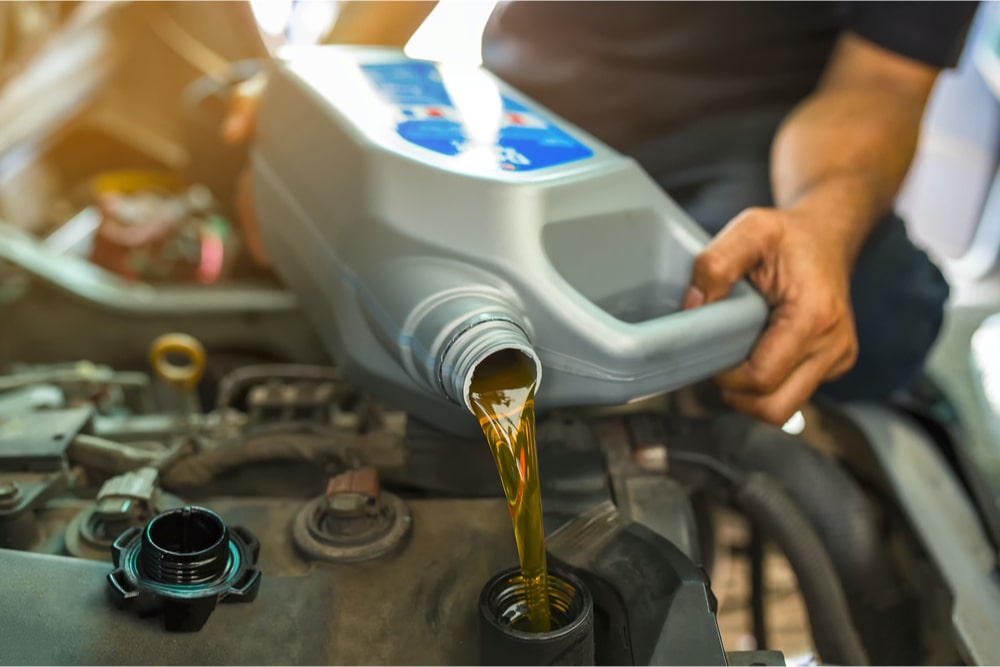Changing the engine oil is a routine task for car owners. But how much does it cost?
The cost of changing engine oil varies. Factors include the type of oil, your vehicle, and where you get it done. Some prefer DIY, while others go to a mechanic. Each option has its own price. Understanding these costs helps you budget better.
It also ensures your car runs smoothly. This blog will guide you through the average costs and what affects them. From synthetic oils to labor fees, we’ll cover it all. So, let’s dive in and explore the expenses involved in changing your car’s engine oil.
Factors Affecting Oil Change Cost
Several factors influence how much you pay to change your engine oil. Knowing these can help you budget better and avoid surprises at the service center.
Type Of Oil
The type of oil you choose affects the cost. Conventional oil is cheaper than synthetic. Synthetic oil provides better performance and lasts longer. Some vehicles need synthetic oil due to their design. Check your owner’s manual to see the recommended type.
Vehicle Make And Model
Your car’s make and model also impact oil change costs. Luxury cars or high-performance vehicles may require special oil. These vehicles might also need more labor. This adds to the overall cost. Older models might need more frequent changes. This is due to wear and tear on the engine.
Service Location
Where you get your oil changed matters. Dealerships often charge more than independent garages. Quick-lube shops might offer competitive prices. But they may not provide the same level of service. Prices can also vary by region. Urban areas might have higher labor costs than rural areas.
Frequency Of Oil Change
How often you change your oil affects the cost over time. Frequent oil changes mean regular expenses. But they can extend your engine’s life. Some cars need oil changes every 3,000 miles. Others can go up to 10,000 miles between changes. Follow your car’s maintenance schedule for the best results.

Credit: news.eastcentral.aaa.com
Types Of Engine Oil
Choosing the right engine oil is essential for your car’s performance. Different types of engine oils cater to various needs and vehicle types. Let’s dive into the main types of engine oil and what they offer.
Conventional Oil
Conventional oil is the most basic type of engine oil. It is suitable for drivers with simple needs. This oil is often used in older vehicles with low to average mileage. Conventional oil is also the least expensive option. However, it requires frequent changes to keep the engine running smoothly.
Synthetic Oil
Synthetic oil offers superior performance and protection. It is made from chemical compounds and provides better lubrication. This oil is ideal for high-performance engines. It helps the engine run efficiently in extreme temperatures. Though synthetic oil is more costly, it extends the engine’s life and reduces wear.
High-mileage Oil
High-mileage oil is designed for cars with over 75,000 miles. This oil contains special additives that reduce leaks and oil consumption. It helps maintain engine seals and reduces wear. High-mileage oil improves engine performance and extends its lifespan. It is a bit pricier but worth it for older vehicles.
Blend Oil
Blend oil combines conventional and synthetic oils. It offers a balance of performance and cost. This oil provides better protection than conventional oil. It is suitable for drivers who want enhanced performance without the high cost of synthetic oil. Blend oil is a versatile option for many vehicles.
Diy Oil Change Vs Professional Service
Changing your engine oil regularly is crucial for vehicle maintenance. You might wonder if you should do it yourself or pay for a professional service. Both options have advantages and drawbacks. Let’s explore them in detail.
Pros And Cons Of Diy
Doing an oil change yourself can save money. You only need to buy the oil and filter. DIY oil changes also let you learn more about your car. This can give you a sense of accomplishment and control.
However, DIY oil changes have some downsides. You need proper tools and space to work. Incorrectly changing the oil can harm your engine. You also need to dispose of the old oil properly. This can be a hassle.
Benefits Of Professional Service
Professional services offer convenience and expertise. Mechanics have the right tools and knowledge. They can spot other potential issues during the oil change. This can save you from future problems.
Professional services also handle the disposal of old oil. This saves you time and ensures it is done correctly. While more expensive, the cost often includes a thorough check-up. This can give you peace of mind.

Credit: www.lubezone.com
Average Costs Of Oil Change
Wondering about the cost of changing your car’s engine oil? The price varies based on several factors. These include the type of oil and your vehicle’s needs. Let’s break down the average costs for different types of oil changes.
Cost Of Conventional Oil Change
Conventional oil changes are the most affordable option. They typically range from $20 to $50. This includes the cost of oil and labor. Conventional oil is suitable for older cars with simple engines.
Cost Of Synthetic Oil Change
Synthetic oil offers better protection for modern engines. It is more expensive than conventional oil. A synthetic oil change usually costs between $50 and $100. The price includes both oil and labor. Synthetic oil lasts longer, which can save you money over time.
Cost Of High-mileage Oil Change
| Type of Oil Change | Cost Range |
|---|---|
| Conventional Oil Change | $20 – $50 |
| Synthetic Oil Change | $50 – $100 |
| High-Mileage Oil Change | $35 – $70 |
Additional Services And Their Costs
Changing your engine oil is essential, but there are additional services to consider. These services can impact the total cost. Understanding them helps budget better for your vehicle maintenance.
Oil Filter Replacement
Replacing the oil filter is a crucial part of an oil change. A new filter ensures clean oil flows through the engine. An oil filter replacement can cost between $10 and $25. The price depends on your car’s make and model. It is a small investment that protects the engine.
Fluid Top-ups
Mechanics often check and top-up fluids during an oil change. These fluids include brake fluid, coolant, and windshield washer fluid. Each fluid top-up can cost between $5 and $15. Maintaining proper fluid levels keeps your car running smoothly.
Inspection Fees
Some service centers offer vehicle inspections with an oil change. They check components like brakes, tires, and belts. Inspection fees range from $15 to $50. This service helps identify issues early and avoid costly repairs. Regular inspections ensure your car’s longevity and safety.
Finding Discounts And Coupons
Changing your engine oil is essential for car maintenance. It can be costly. Finding discounts and coupons can help save money. Here are some ways to find great deals.
Online Deals
Many websites offer discounts and coupons for oil changes. Websites like Groupon and RetailMeNot have deals for different service centers. Check their automotive sections. They often list the latest offers.
Some service centers also post their discounts online. Visit the official websites of Jiffy Lube, Firestone, or Valvoline. Look for their promotions or deals sections. They usually have printable coupons or codes you can use.
Service Station Promotions
Service stations often run promotional offers for oil changes. Visit your local service station and ask about current deals. Many stations offer discounts during specific months or holidays. This is especially common during car care events.
Some service stations provide loyalty programs. These programs reward frequent customers with discounts. Ask your local station if they have such a program.
Membership Discounts
Being a member of certain clubs can give you oil change discounts. For example, AAA members often receive special offers at participating service centers. Always carry your membership card and ask for available discounts.
Other memberships, like Costco or Sam’s Club, may also offer deals. Check their automotive service sections online or in-store. You might find significant savings.
Frequency Of Oil Changes
The frequency of oil changes is crucial for your car’s health. Regular oil changes ensure your engine runs smoothly. They also extend the lifespan of your vehicle. How often should you change your oil? Several factors influence this. Let’s explore them.
Manufacturer Recommendations
Every car manufacturer provides guidelines for oil changes. They base this on the car’s engine type and performance. Check your owner’s manual for these details. Most suggest changing oil every 5,000 to 7,500 miles. Some modern vehicles can go even longer. Following these recommendations keeps your warranty valid.
Driving Habits
Your driving habits also impact how often you need an oil change. Frequent short trips can cause oil to break down faster. So can driving in heavy traffic. Do you drive at high speeds often? This also affects oil life. Long-distance driving on highways is gentler on your engine oil.
Environmental Factors
Climate and environment play roles too. Extreme temperatures, both hot and cold, can degrade your oil quicker. Dusty or sandy areas add contaminants to your oil. High humidity can also impact oil quality. Consider these factors when planning your oil changes.

Credit: www.vermilionchevrolet.com
Long-term Savings Tips
Changing the engine oil is a regular expense for car owners. But with a few simple tips, you can save money in the long run. Here are some long-term savings tips to help reduce your engine oil change costs.
Regular Maintenance
Regular maintenance is key to keeping your engine in good shape. It prevents issues that can lead to costly repairs. Schedule oil changes based on your car’s manual. Following this schedule keeps your engine running smoothly and prevents wear and tear.
- Check the owner’s manual for the recommended oil change interval.
- Stick to the schedule to avoid unnecessary engine wear.
- Regular checks can spot problems early, saving on repairs.
Using Quality Oil
Using quality oil can make a big difference in your engine’s performance. High-quality oil can reduce friction, improve efficiency, and extend the life of your engine. It might cost more upfront, but it saves money over time.
| Oil Type | Cost | Benefits |
|---|---|---|
| Conventional Oil | $$ | Basic protection, affordable |
| Synthetic Oil | $$$ | Better performance, longer intervals |
| High-Mileage Oil | $$$ | Best for older engines, reduces leaks |
Monitoring Oil Levels
Monitoring your oil levels can prevent engine problems. Low oil levels can cause damage and lead to expensive repairs. Check your oil level regularly to ensure it’s at the right level.
- Park your car on a level surface.
- Wait for the engine to cool down.
- Pull out the dipstick and wipe it clean.
- Insert the dipstick back in and pull it out again.
- Check the oil level. It should be between the “min” and “max” marks.
Keeping an eye on your oil level helps you catch issues early. This can save you from costly engine repairs.
- FAQ-
Frequently Asked Questions
Explore our Frequently Asked Questions section to find quick solutions and detailed information about our services, processes, and policies.
How Much Does An Oil Change Cost?
The cost of an oil change varies. It ranges from $20 to $75. It depends on vehicle type, oil type, and location.
Is Synthetic Oil More Expensive?
Yes, synthetic oil is more expensive. It typically costs between $45 and $75. It offers better performance and protection.
How Often Should I Change My Engine Oil?
Change your engine oil every 3,000 to 5,000 miles. Check your vehicle's manual for specific recommendations.
Can I Change My Own Engine Oil?
Yes, you can change your own engine oil. It requires basic tools and knowledge. It can save you money.

